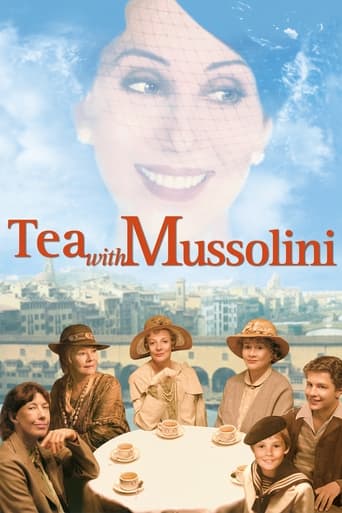mark.waltz
When you're going up against the likes of Maggie Smith, Judi Dench, Lily Tomlin, Joan Plowright and Cher, you've got a lot to stand up against. Even the men of Mussolini's fascist Italy find this out as they try to toss the English out on their ear and find that, like France's Madame DeFarge did with England's Miss Pross, that "I am an English woman! I am your match!".It all begins in peacetime as a British ambassador's widow (Smith) holds court while subtle hints of fascism are rising around them. The snooty dowager has no place at her society teas for Cher, but she's going to have to change her mind as the world begins to crash around them and the British society she has known refuses to stand up and leave even though their lives are at stake. More gentle are Ms. Dench and Ms. Plowright, artistic types who take interest in a young orphan, a "bastard" not wanted by his biological father, and publicly humiliated by the father's wife. Cher, a friend of his mother's, arranges for him to get a trust fund, and after his father sends him off to Germany for a fascist education, the English women return to their lives as they prepare to fight their own battle with Mussolini. Dame Maggie is the one of the group who has "Tea With Mussolini", promised peace and protection by him, a promise he surely won't keep.The episodic feel of the film shows up as the years flash by on screen, and the boy returns as a young man with the intentions of helping the women survive their imprisonment in an abandoned Italian castle. He discovers that Cher has been betrayed by her lover, and with the help of Smith's grandson (whom she has been disguising in women's clothes for years), arranges to help Cher escape. A lot happens in two hours, but with these divas, it speeds by, especially with Smith's dry sarcasm, Dench and Plowright's warmth, Tomlin's masculine energy, and Cher's "Auntie Mame" like diva. Cher is the only one who seems (only slightly) out of her comfort zone. Period pieces don't seem to suit her, and when she breaks into a chorus of "Smoke Gets In Your Eyes", it seems like a moment of desperation.In spite of all that, this is a very likable film, and there are some light-hearted moments included inside one of the most tragic times in our recent history where freedom was threatened on every level. Thanks to a fast-paced direction and lavish sets and beautiful countrysides, "Tea With Mussolini" is a winning drama that might not be perfect but one that its audience will find things to admire. In the end, this is more about the women who really have nothing at all in common but the need to survive and the realization that they cannot do it alone.
DesbUK
The Italian Anglophile Franco Zefferelli's endearing account of Englishness in 1930s/40s Italy is amongst his finest films. He co-wrote it with the English writer John Mortimer. It begins in Italy in 1935 at Elizabeth Barret Browning's grave - a symbol which bonds England and Italy. The English expatriates are represented by Judi Dench, Joan Plowright and a compelling Maggie Smith (winning the 1999 Bafta for Best Supporting Actress). Plowright is secretary to an Italian businessman who wants his young son Lucca to grow up to be a proper English gent - so Plowright teaches him Shakespeare and feeds him bacon and eggs. Then the rise of fascism means Lucca must be sent off to Austria. There follows a quite touching scene where the English ladies say goodbye by reciting the St Crispin Day's speech from Henry V at the railway station.The remainder of the drama follows the ladies' fortunes under the dictatorship of Mussolini. Smith's character, Lady Hester, is the widow of a former British ambassador, and does indeed take afternoon tea with Il Duce. The English ladies end up being in-turned but their Englishness remains defiant. During the Allied invasion of Italy, they are liberated by a Scottish regiment. Lady Hester declares: "The Germans and the Italians couldn't get rid of us, so there's no reason why we should surrender to the Scots."
JasparLamarCrabb
Despite the cast, this isn't a Merchant/Ivory production. Franco Zeffirelli's autobiographical film of his youth spent amongst the English "Scorpioni" in Florence before and during WWII is a very heartfelt piece of work. In the hands of three British ex-pats (Maggie Smith, Judi Dench, and Joan Plowright), young "Luca" is raised to appreciate art and life...and to tolerate A LOT! Also in the mix is Cher, as an American showgirl/benefactor with the exhaustive name of Elsa Morganthal Strauss-Armistan, and Lily Tomlin as a free-spirited archaeologist. The acting by all is exceptional, with Plowright a real standout as the Earth mother of the group. Cher has the longest name, but the briefest role. It does, however, turn out to be very pivotal. Dench is very funny as a ditsy culture vulture and Smith is perfect as the uptight (self appointed) leader of the den. Zeffirelli's script (co-written by John Mortimer) is funny (is there really a tea with Il Duce?), suspenseful, and even a little scary. This is the director's finest film in years. The great cinematography is by David Watkins.
moonspinner55
Young boy from a broken home is 'adopted' by a group of elderly British women in pre-WWII Florence, Italy. Director Franco Zeffirelli's rather self-conscious valentine to his own childhood is slushed with poetic sentimentality, most of which feels distinctly artificial. The young lad at the heart of the piece isn't at all memorable, and the ladies unfortunately fare no better (but where else can you find Cher, Judi Dench, Joan Plowright, Lily Tomlin and Maggie Smith together on-screen?). Some of the more subtle moments (such as the child waiting for someone to pick him up after school) touch on a velvety kind of youthful longing that is rather sweet, but the drippy dialogue and obvious "scene stealing" opportunities for the femme stars drain much of the sincerity from the mix. ** from ****






